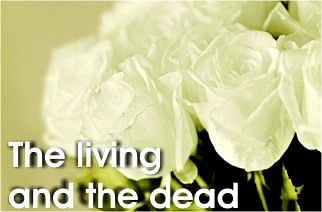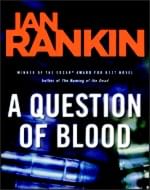
|
Home |
Issues | The Daily Star
Home
|
|
|
Leave me alone The nurse looked at me with a kindly, sympathetic smile. 'There, there,' she said, her eyes too bright, her voice too cheerful. 'Why don't we have our breakfast, and then go out for a little stroll?' 'I don't want to go out for a little stroll,' I told her firmly. 'I want to get out of here.' The nurse continued smiling benignly and bustled out of the drab, narrow room. I watched her retreating back, cursed her under my breath, and fell back on my sagging bed. The ceiling, I noticed, was marred with hairline cracks. The sunlight that streamed in through the little window made interesting patterns on the whitewashed walls. For a painfully long minute, I craved for my mother's bread pudding. She would make one from scratch every weekend, and watch over me while I tucked in. I wondered if she still bothered cooking anymore, now that I'd been away from home forhow long? A month? Two months? My eyes fell on the calendar on the wall opposite. And my heart leapt in my throat when I saw that I'd been in this place for nearly six months. Six months! Where had the time gone? I looked blankly around me. The nondescript bed, the whitewashed walls, the ceiling with the hairline cracks. And, through the window, manicured gardens. The nearly eight-year-old gardener was stooping over a hedge, shears in his hands, clipping away, oblivious to the men and women in white that were walking up and down the path, their faces vacant, their eyes unstaring. The gardener, I figured, had been here long enough to avert his mind from the unpleasantness that lay thick in the air. I, unfortunately, was yet to master that art. The nurse from earlier that morning bustled into my room, bearing a tray with little cups. 'Time for your pills, dear,' she chirped, handing me a small plastic cup. She watched over me as I dutifully swallowed the pills, washed them down with a swig of water. I handed the cup back to her, and said 'I seriously want out' as firmly as I could. 'Why don't you tell the good doctor what's bothering you?' she suggested. The smile never dropped from her toad-like face. 'I'm sure he can help.' With that, she was gone. I scoffed at her suggestion. Tell the good doctor what, exactly? 'Oh, doctor, doctor. Please let me out. I don't belong in a loony bin. Let me go home.' I'm sure that line had been used on the good doctor before. Every patient here must have said the same thing. And then, over the course of a year or two, they too had lost their voice, had resigned themselves to a fate of being imprisoned in said loony bin. Ergo the vacant faces and the unstaring eyes. But not me. My eyes, though sunken, were still very much alive. And I wanted out of this place with every iota of my being. I paced the room. I kicked the bed. I tried counting the cracks in the ceiling. I was on the verge of picking apart my mattress when the nurse bustled into my room for the third time that morning and announced that the good doctor would see me now, and she was going to escort me to his office. 'And then can I leave?' I asked her, as she took me gently but firmly by the elbow, and steered me down the corridor to Good Doctor's office. 'Uh' The polished door opened. I was ushered in, deposited in a squishy leather chair, and then the nurse turned on her heels and left. Mr. Good Doctor peered at me kindly over his glasses. He was sitting behind his massive desk, his egg-shaped head framed by a reproduction of some Impressionist painting. 'And how are we feeling today?' he asked. 'I don't know about you, but I'm feeling fine.' I shifted in the chair. 'Listen, I don't know what you people think about me, but I'm absolutely fine. Can't I please go home?' The doctor smiled. He got up from behind his desk and took a step towards me. The smile disappeared from his face when a blood curling scream shattered the peace of his office. 'Leave me alone!' I screeched, clutching at my hair. 'Leave me alone!' This was no doctor. This was him, bearing down on me, unbuckling his belt, his face drawn in a monstrous mask of vile pleasure. And this was no sun-kissed office. The walls, grimy, streaked with paint, and the floor, dirty and barren, were closing in on me. 'Leave me alone! Leave me alone! Leave me' The last thing I saw was his face. Then everything faded to black. 'No luck today, doctor?' the nurse asked, disposing of the hypodermic needle, and hoisting the patient to her feet. I looked at the patient, and then sadly shook my head. 'No luck today.' 'Well, then.' The nurse struggled to keep the smile on her face. 'Maybe tomorrow.' 'Yes.' I tried smiling back. 'Maybe tomorrow.' By Shehtaz Huq and Emil 
Tears rolled down my cheeks as I stood in front of my aunt's body, in a trance. I was devoid of all senses and stared blankly at her innocent face, almost believing for a moment, that she would move. How could she remain so calm and motionless? I couldn't believe at all that she was dead. She ought to be playing pranks with me! But no she was sleeping so soundly and peacefully. The sparkling eyes that once used to look at me affectionately were now closed. She had left all of us forever and had gone to a world so unknown, so mysterious and transcendental that I couldn't even imagine. I had so many secrets to stuff her with. There was so much to tell her about how much I loved and missed her that I would have died for a minute to talk to her. Why hadn't I told her these things before? What had stopped me from doing that? “Maybe because I took life for granted and figured I would have plenty of time to talk with her”, I answered myself. Past memories flashed in my mind and my attempts to remember them failed. I felt as if I was falling through an endless tunnel, the tunnel being my mind, which seemed to hang between living world and that of the dead. I remember once when I had come home for my summer vacation she had stood on the doorway holding a cake in her hand. I used to love those cakes. I treasure the happy moments of my life that I have spent with her. She used to give me white roses for my birthday. “Can you tell me the difference between the plastic roses and the ones that you just gave me now?” A smile spread over her face and she said, “The difference is the same as is the difference between a dead person and a living soul” Suddenly my eyes fell upon a garden of white roses near the graveyard. I went there and plucked a white rose. I gazed at it for a long moment until I could feel the difference between it and the corpse of my aunt- the difference between the living and dead. By Sukanya Sravasti A Question of Blood  I remember this hilarious situation back in high school where a couple of my classmates got into a fight, and one of them verbally abused the other, who just happened to be…ah, very dusky complexioned, by saying something along the lines of 'Choppol khule marbo, Kaliya!” This threat just happened to get overheard by one of our teachers, who, being a tad bit on the dark side herself, took it to mean that the statement was addressed towards her, and raised a stink about it with the school authorities.
I remember this hilarious situation back in high school where a couple of my classmates got into a fight, and one of them verbally abused the other, who just happened to be…ah, very dusky complexioned, by saying something along the lines of 'Choppol khule marbo, Kaliya!” This threat just happened to get overheard by one of our teachers, who, being a tad bit on the dark side herself, took it to mean that the statement was addressed towards her, and raised a stink about it with the school authorities.
Despite all the boy's protestations, the 'evidence' was dead against him (of course, no one bothered to ask the twenty odd eye-witnesses, i.e. us), and the entire clique of friends ended up getting re-assigned to different sections. So yeah, sometimes you're guilty even after you're proven innocent. When A Question of Blood opens, Detective Inspector John Rebus finds himself in a similar predicament, albeit of a more serious nature. He happens to be sporting some burn injuries, which he received on the very night a man died in a fire. The victim just happened to be someone who was threatening his DC Siobhan Clarke, Rebus' loyal sidekick. Now, accusations of murder are never convenient, but this one comes up right when Rebus and Clarke have been drafted to investigate a school shooting.
Thus begins another riveting read by Ian Rankin. The story goes on to show how there might sometimes be something more to an 'open-and-shut' case, with probing into the history of the shooter, now deceased, opens up a whole new can of worms. With his wry wit and eye for detail, Rankin takes his readers on another crazy chase for the truth. This book takes up where The Falls left off, and we meet some now-familiar characters; DC Grant Hood the liaison officer who once held a candle for DC Clarke, the short-tempered and paranoid Gill Templar, Rebus' former flame and current boss, and the ever persistent and annoying Steve Holly, the tabloid journalist who loves complicating matters. Moving deeper into the story, we also come to learn of Rebus' military background, finding skeletons the Inspector would rather have kept buried. Further spice is added to the tale when DC Clarke's supposedly deceased stalker begins to speak to her from beyond the grave, through anonymous letters. The multiple threads make up for a gripping tale that keeps the reader guessing till the very end. The Rebus stories, as Rankin writes them, are more than crime stories; they're a lifestyle, and the author often works into the case-solving process descriptions of the bars that the policemen frequent, the food they eat, the music they listen to, skilfully weaving these details into the dialogue and narrative without losing thread of the story the way some other authors (*cough*Tolkien*cough*) do. As he had done with The Falls, Rankin also fleshes out his story with anecdotes about popular culture or history, choosing to dwell on the Goth culture in this book. It is also interesting to note how the author uses local slang and colloquialisms to paint a more vivid picture. If you're in the mood for some brain ticklers, this is the perfect book. By Sabrina F Ahmad |
|
| home
| Issues | The Daily Star Home © 2008 The Daily Star | |